If you’re a cat owner, you’ve probably experienced the unpleasant surprise of finding cat pee in your suitcase. Whether it’s due to separation anxiety or territorial marking, it can be frustrating and challenging to remove, especially when the stain has had time to set in and reach deeper parts of the suitcase, like the cardboard liner (present in some suitcases) or the hard suitcase liner.
With the above in mind, we delve into how to get cat pee out of suitcases and travel bags.
This comprehensive guide provides step-by-step instructions and tips for getting cat pee out of your suitcase and preventing future incidents. We’ll show you how to use common household cleaning agents like white vinegar, baking soda, and hydrogen peroxide to neutralize the smell.
Besides homemade cleaners, we recommend using enzymatic cleaners like Nature’s Miracle to disintegrate and thoroughly wash off the cat’s urine odor.
Understanding Why Cats Pee In Suitcases
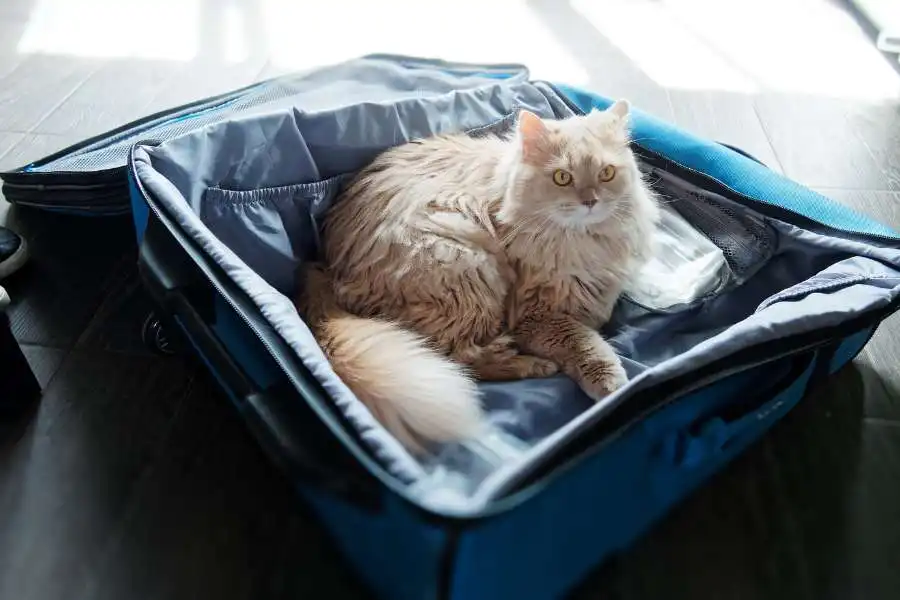
Cats may urinate in luggage for various reasons, including anxiety, stress, or territory marking. In addition, they are sensitive to environmental changes, and traveling can be stressful.
You need to understand the reason your cat pees in your suitcase to be able to solve issue permanently. Here are some of the reasons your cat may pee in your suitcase:
#1. Medical Reasons
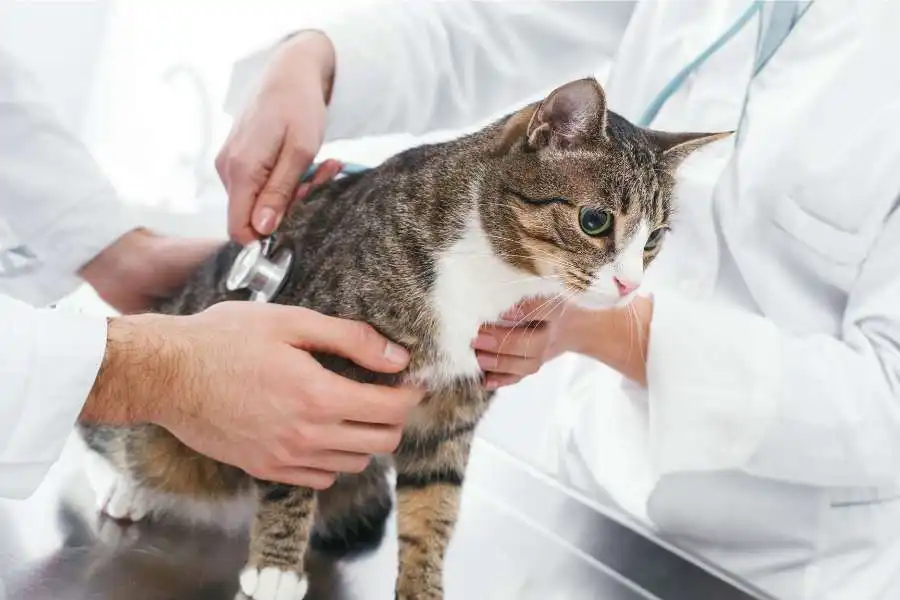
Illnesses such as diabetes, hyperthyroidism, urinary tract infection, and bladder or kidney stones, among others, can impede normal urine flow in your cat’s urinary system, causing pain and discomfort during urinating.
In dire situations, the urine may be blood-stained or not come out.
Your Might Interested To Learn More About Why Cat Urine Smells So Bad
And so, the cat tends to associate the negative urination experience with the litter box, which leads to litter box aversion.
Usually, the cat pees on your bed, suitcases, or other surfaces when looking for a soft surface instead of the litter box to alleviate pain and send a message to the owner that something is amiss.
It is best to seek professional intervention when you notice your cat straining to urinate or crying (or other vocalizations) when peeing. Other signs of sickness may include frequent urination, increased intake of water, licking of the genitalia, and loss of appetite.
And so, the cat tends to associate the negative urination experience with the litter box, which leads to litter box aversion.
HAs Your Cat Peed On Your Bed Sheets? Learn How To Remove The Urine Stain Here!
#2. Marking Its Territory
Cats rely on the strong smell of their urine (or poop) to communicate with other cats. When the cat is feeling anxious or threatened by other cats in the household or neighborhood, it naturally results in inappropriate elimination.
To feel safe, cats scratch or rub their faces or bodies on surfaces to make them smell like them. Without this familiar smell, the cat gets anxious and can start to spray around the home.
They can even go further and mark their territory by spraying.
Cats are territorial animals and generally do not like to share living space, food, or their owner’s attention with foreign cats or even cats in the same home. Peeing on or in your suitcase is your cat’s way of fighting the threat and claiming ownership of that space.
#3. Attracting A Mate
Statistics show that a neutered male cat or spayed female cat is less likely to urine mark to attract a mate. Note that your cat can be spraying in your luggage (especially if you store it in a secluded area such as your garage) when in heat, trying to communicate its availability to potential mates.
#4. Stress Or Anxiety
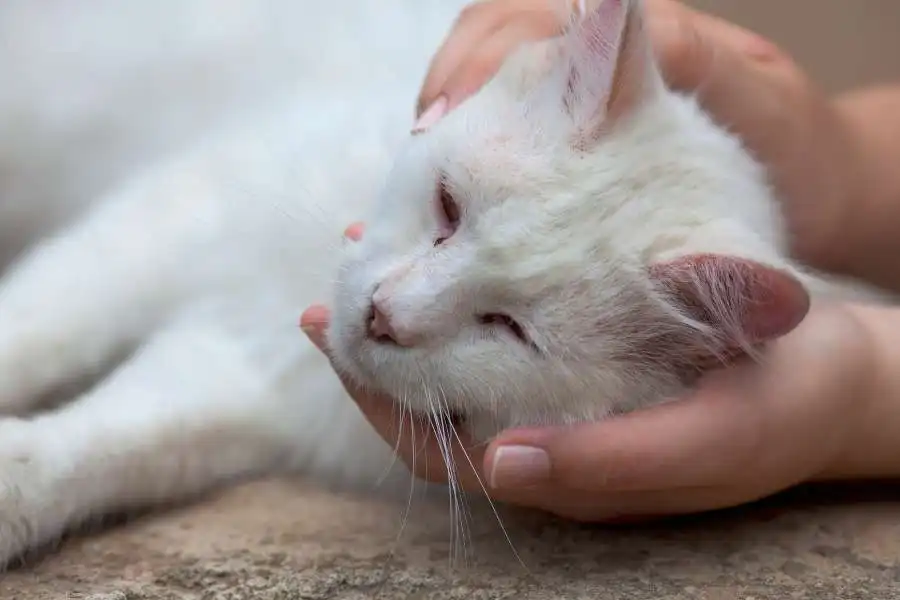
Some common situations likely to stress your cat or cause anxiety include relocating to a new home, drastically changing the cat’s routine or diet, moving furniture around your home, adding a new family member or pet, and other environmental changes.
Such changes can stress your cat and lead to inappropriate urination. Importantly, the cat will tend to hang around and urinate in places it’s familiar with – such as your suitcases and travel bags.
We will show you some ways to reduce your cat’s stress and the probability of inappropriate urination.
#5. Litter Box Issues
Your cat will likely adopt bad urination habits if it is uncomfortable using the litter box you provided. Some of the litter box considerations to keep in mind include the following:
Cleanliness – Cats are hygienic animals that spend at least five hours grooming themselves daily – they certainly hate using dirty litter boxes, which is a common cause of inappropriate urination.
Location – Cats also hate using litter boxes in high-traffic areas without privacy.
Type of Litter – Sudden changes in litter type can induce stress in your cat and lead to inappropriate urination. It is essential that your cat like the litter you have provided to encourage it to always go into the litter box.
You may have to experiment with varying litter types to find your cat’s preference. Does your cat prefer scented or non-scented litter? Clumping or non-clumping litter?
Depth of litter – The ideal depth of the litter should be 6cm. You should note that cats are hard-wired to bury their waste as a survival trait. Shallow litter can be stressful to the cat and lead to bad litter box habits like inappropriate elimination.
Enough Litter Boxes – Also, ensure you provide adequate litter boxes if you have multiple cats in your household. Consider scooping at least once a day, or more often, to keep the litter box clean and attractive to the cat.
The Design of the Litter Box – A high-sided litter box makes it hard for an arthritic or elderly cat to get in and out effortlessly. The ideal litter box also needs to be large enough to permit the cat to turn around and bury its waste without its rear touching the edges of the box.
Cats can urinate inappropriately when they do not like the conditions of the litter box.
#6. Attention-Seeking Behavior
Sometimes the cat may look for your attention in unorthodox ways, like peeing on your suitcase or scratching.
The cat may be enticed to pee in your suitcase, particularly because it smells like you, especially after packing your worn clothes. If you face such a situation, you only need to find ways to keep your cat stimulated, like interactive play.
Finally, there are other anecdotal reasons your cat may pee on your luggage. For instance, cats can associate the suitcase with their owner’s scent and feel comforted by being near it. By peeing on the suitcases and bags, the cat is essentially taking ownership of it.
In the same light, cats are smart enough to correlate the sight of your luggage with their owner leaving the house, which can be mentally unsettling and lead to inappropriate urination.
Learn How To Get Rid Of Cat Poo Smell From Shoes
How To Get Cat Pee Out of Suitcases: Step-by-Step Guide
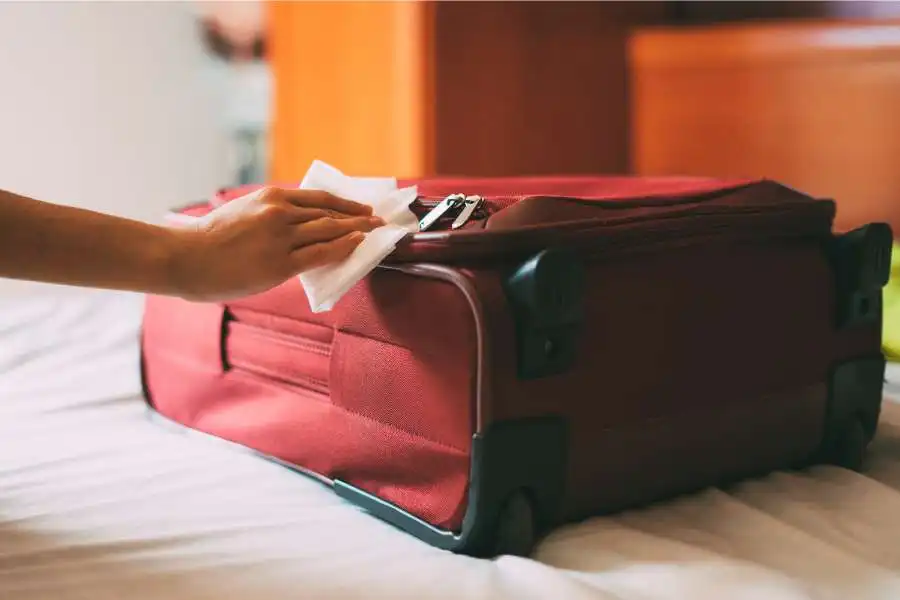
Before cleaning cat urine out of your suitcase, wear gloves and protect your skin from the cleaning solution. Here’s what you’ll need:
- Enzymatic cleaner or white vinegar
- Water
- Baking soda
- Paper towels
- Scrub brush
- Vacuum cleaner
Steps to follow:
Step #1: If the urine stain is still wet, use dry paper towels or an old towel/rag to dab and blot the wetness before you proceed. Press the paper towel on the stain and hold it in place to soak up as much moisture as possible.
Repeat this step until the paper towels turn up dry. Ensure you are not rubbing the stain to avoid pushing it deeper or spreading it further.
Step #2: Mix equal amounts of white vinegar and water in a spray bottle. Test the solution on an inconspicuous part of the suitcase to avoid staining the suitcase or bag, then spray the affected area.
Apply a generous amount until the stain is well-saturated. If the stain has seeped through the casing and penetrated the outer shell, then turn over the case and apply the cleaning agent to the stain.
Consider also using a commercial cleaning product like an enzyme-based cleaner to break down the urine stains and dissipate the odor. Follow the instructions to achieve the best results when using a store-bought product.
Step #3: Let the cleaning solution sit for at least 10 minutes. If the stain has already dried on the suitcase, use a soft-bristled brush or an old toothbrush to scrub off the stain, being careful not to damage your luggage.
Step #4: Blot the area with paper towels to absorb the solution.
Step #5: Repeat steps 2 to 4 until the smell is gone.
Step #6: Sprinkle baking soda on the affected area and let it sit overnight. As a mild alkali, baking soda helps to break down urine stains, dirt, and grease quickly, which helps to dissolve the stain for easier removal.
Step #7: Vacuum the baking soda in the morning with a hand-held vacuum attachment.
Step #8: Sun It. The sun’s UV rays kill bacteria and help the bag to dry faster. In addition, fresh air helps to get rid of the bad odors.
Step #9: If the smell persists, use an enzymatic cleaner following the instructions on the label.
Read Our Guide On The Best Way To Clean Cat Urine From Your Mattress
Alternative Methods You Can Use To Get Cat Pee Smell Out of Luggage
If you’d like alternatives to try out, you can try any one of these deodorization solutions to remove the cat pee smell from your luggage:
#1: Use Hydrogen Peroxide: Hydrogen peroxide differs from water in that it has an extra oxygen molecule and is an effective oxidizer that can wash off organic compounds from your travel bags. It is also non-toxic and environmentally friendly.
Look for a formulation with a 3% concentration of hydrogen peroxide; mix one cup of hydrogen peroxide with water in a spray bottle. Mix 50% hydrogen peroxide and 50% water if you want a more concentrated solution for persistent odors.
#2: Commercial Pet Odor Neutralizers: You can forgo using home supplies to clean your suitcase or travel bags and use commercially available cleaning solutions. Look for a pet odor neutralizer that’s safe for use on luggage and follow the instructions on the label.
Consider enzyme-based cleaners like Nature’s Miracle, an effective stain remover like Febreze Cat Stain, and Odor Remover, or Oxygen-based cleaners like Oxiclean.

#3: Activated Charcoal: Place a few pieces of activated charcoal in your suitcase for a few days to absorb the smell. Alternatively, you can use appropriate cat litter to absorb the urine odors from the luggage.
#4: Essential Oil Solution: Mix a few drops of essential oil and water in a spray bottle and deodorize the affected area. Test the solution in an inconspicuous area to avoid staining your bags.
Besides deodorizing the suitcase to eliminate the urine odor, essential oil solutions can deter the cat from urinating on the suitcase. However, be careful when using essential oils as they are toxic to cats when ingested due to the presence of phenols.
#5: Baking Soda and Vinegar: Mix equal parts of baking soda and white vinegar to create a paste. Apply the paste to the affected area and let it sit for a few hours before rinsing with water.
Tips for effective cleaning:
- Test the cleaning solution on the suitcase’s small, inconspicuous area first to avoid discoloration.
- Use a blacklight in darkness to find the location of the cat’s urine stain. The stain should reflect a fluorescent white light when illuminated with black light.
- Don’t automatically use a washing machine or dryer to clean your suitcase, as these can damage the material, especially one made from coated fabric. Check the manufacturer’s cleaning instructions
Learn How To Get Rid Of Cat Pee Out Car Upholstery
Washing Suitcases And Bags: Dos And Don’ts
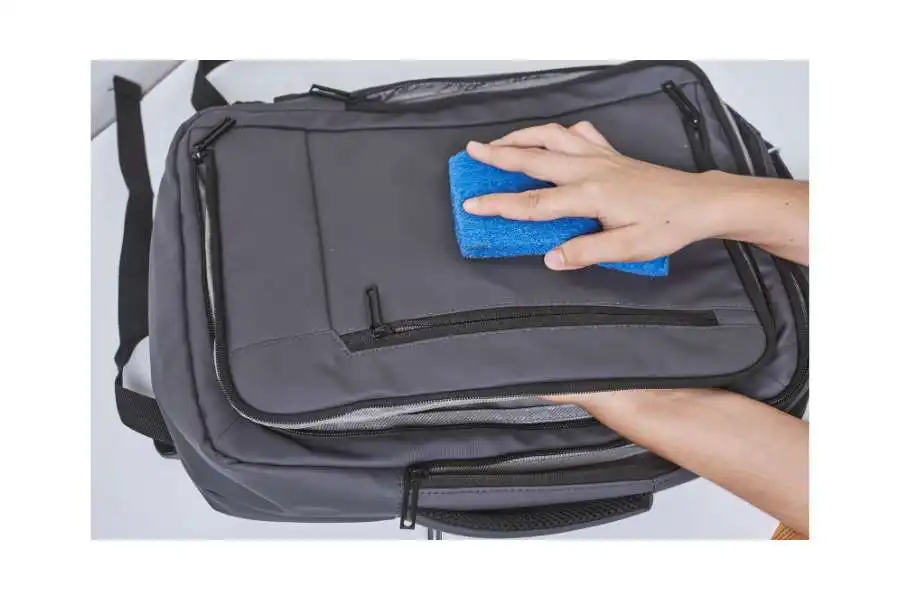
If your suitcase is washable, follow these tips for cleaning it:
- Use mild detergent and cold water.
- Wash the suitcase by hand or on a gentle cycle in the washing machine, even if it’s machine washable.
- Hang or lay the suitcase flat to dry.
- Avoid using bleach or fabric softener.
- Avoid using hot water to wash the bag or suitcase.
- Avoid using bleach or ammonia-based cleaners, as these can worsen the smell. Also, be careful with chlorine-based bleach, which can stain your suitcase.
If your suitcase is not washable, use a disinfectant spray or wipe to clean it.
Preventing Future Incidents
To prevent cats from peeing in your suitcase in the future, you can take these precautions:
- Keep your suitcase in a closed closet or room your cat can’t access. Alternatively, use a physical deterrent like aluminum foil or double-sided tape to protect the cat from your suitcase.
- Ensure you clean the urine odor thoroughly to prevent the possibility of your cat being attracted by the scent to pee on your bags again. You may need an enzymatic cleaner to disintegrate the odor-causing organic compounds in the urine.
- Provide your cat with a comfortable and familiar space at home, especially when you are away from home. You may need to close the windows to prevent the neighboring cats’ whiffs from entering your house and unsettling your cat.
- Provide enough litter boxes, food, and water bowls if you have multiple cats.
- Ensure the litter box is clean and placed in a low-traffic area in the house to provide your cat with the privacy it needs to use it comfortably. Also, it is best to scoop at least once a day as part of the measures to keep the litter box clean.
- Use a pheromone diffuser to calm your cat’s anxiety.
- Cover your suitcase with a towel or a non-absorbent material like a shower curtain.
- If you’re going on a trip, keep your cat in a familiar environment or ask someone to check on them regularly.
- Consider getting your cat a scratching post or interactive toys to keep them mentally stimulated and relieve stress—cats like climbing on vertical spaces as part of their natural hunting instincts. Therefore, cat trees with hiding spaces and scratching surfaces can provide the mental stimulation your cat needs to stay calm.
- If your cat is experiencing anxiety or stress, talk to your veterinarian about possible solutions, such as medication or behavior modification techniques. Your cat’s vet may recommend Prozac medication to relieve stress in your cat.
- Clicker training or positive reinforcement also helps. And so, remember to praise and reward your cat for good behavior to encourage positive habits. Avoid punishing your cat for inappropriate urination, as it only stresses the cat further and aggravates the problem.
By following these steps and taking precautions, you can prevent future incidents and enjoy traveling with your feline companion without any surprises.
Final Thoughts
In conclusion, getting cat pee out of your luggage can be challenging, but with the right tools and techniques, it’s possible to remove the odor and prevent future incidents. Remember to use a gentle cleaning solution and avoid harsh chemicals that could damage your bag.
By understanding why cats pee in suitcases and taking precautions to prevent future incidents, you can enjoy a stress-free and odor-free traveling experience with your furry friend.
FAQs:
Q: How can I tell if my cat has peed in my suitcase?
A: The odor of cat urine is typically the first sign, but you may also notice dampness or stains on the suitcase.
Q: Can I use bleach to clean my suitcase?
A: No, bleach can damage the fabric or material of your suitcase. Use a gentle cleaning solution instead.
Q: How long does it take to get rid of the cat pee smell?
A: Depending on the severity of the odor, it may take several rounds of cleaning and airing out your suitcase. It’s best to be patient and thorough in your cleaning process.
Q: Why do cats pee in suitcases?
A: Cats may pee in suitcases due to stress or anxiety, marking their territory, or a medical issue. Consult with your veterinarian if you’re concerned about your cat’s behavior.
Q: How can I prevent my cat from peeing in my suitcase again?
A: Keep your cat in a familiar environment or ask someone to check on them regularly while you’re away. Provide your cat with a scratching post or toy to relieve stress and anxiety. Consult with your veterinarian if your cat is experiencing behavioral or medical issues.

